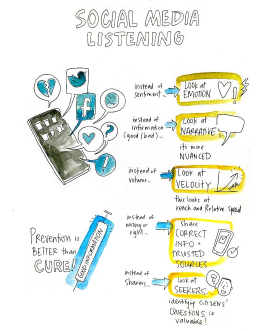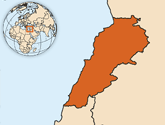 With so many means to spread information in the 21st century, a dangerous epidemic of misinformation has been circulating through different communication channels and in communities since the beginning of the COVID-19 outbreak.
With so many means to spread information in the 21st century, a dangerous epidemic of misinformation has been circulating through different communication channels and in communities since the beginning of the COVID-19 outbreak.
With the sudden and deadly onset of the COVID-19 pandemic, each country has found itself struggling to contain the disease’s effect on the health of its population. Lebanon acted quickly even before the first positive case was identified. The WHO office in Lebanon worked closely with the Ministry of Public Health to provide much needed health system support to accelerate the response.
It was also essential to provide accurate information disseminated at the right time. A risk communication and community education taskforce was established, which included United Nations agencies, local nongovernmental organizations, Lebanese Red Cross, Ministry of Public Health, Ministry of Information and others. Their main task was to assess the situation on the ground, reach out to communities and engage with key messages that will allow the smooth and fast flow of information on how to avoid being infected with and how to protect from COVID-19.
Together with UNICEF and in collaboration with the Ministry of Public Health, Ministry of Information and MEHE a set of animated videos was produced and disseminated on local TV stations and social media platforms within record time. The first batch of videos targeted children comprising a set of 3 animated videos with Tala, a child character, who addresses children on how to wash their hands and 2 videos on how to protect themselves from coronavirus.
The other videos addressing the general public and health care workers are listed below:
- How to protect yourself
- What are the symptoms to look out for
- Safe travel during the COVID-19 pandemic
- How health workers can protect themselves
- How to home isolate, especially when returning from travel
- Addressing stigma and bullying during coronavirus
- Breastfeeding
- Mental health
- Nutrition.
Other than videos, WHO along with partners also produced a number of brochures and flyers on handwashing, protection during travel, student protection and many more.
Not long after declaring COVID-19 a pandemic a new wave of misinformation took over the social media platforms and spread to people who repeated what they read or heard regardless of its authenticity.
On the 22 April 2020, WHO Lebanon office partnered with the Ministry of Information and 2 sister agencies – UNICEF and UNDP – to counter the spread of COVID-19 misinformation in Lebanon. A rumour log was created to record locally monitored rumours, verify them and provide neutral, accurate, trusted information to dispel the rumours. The log was placed on the Ministry of Information website.
This partnership has already produced 3 videos by medical influencers Dr Walid Ammar, Director-General of the Ministry of Public Health, Dr Abdul Rahman Bizri, member of the National Committee for Communicable and Infectious Diseases, and Dr Myrna Doumit head of the Order of Nurses in Lebanon. So far, 2 videos have addressed fake information or rumours and were widely distributed on all channels to reach the widest possible number of people. These videos focus on how long the coronavirus stays on surfaces and how surfaces should be cleaned and highlighted that drinking alcohol or bleach does not kill or protect people from COVID-19. There are 6 more videos under production which will be released next week. There is an ongoing campaign in the media and on social media platforms to address fake news.
The taskforce has also addressed concerns about the spread of the virus in refugee camps in Lebanon sharing messages with camp leaders to share with the inhabitants of the camps. Messages were also shared with refugees through Facebook, the UNHCR website, community health care volunteers and pamphlets included in hygiene and dignity kits.








